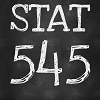Be the boss of your factors
- Load the Gapminder data
- Model life expectancy as a function of year
- Get to know the country factor
- Why the order of factor levels matters
droplevels()to drop unused factor levelsreorder()to reorder factor levelsreorder()exercise- Revaluing factor levels
- Grow a factor object
- Make a factor from scratch
As of 2016-10-11 this is deprecated. STAT 545 is now using the forcats package for factor management, which is covered in the current factor lesson.
Load the Gapminder data
As usual, load the Gapminder excerpt and the ggplot2 package. Load plyr and/or dplyr. If you load both, load plyr first.
library(gapminder)
library(plyr)
suppressPackageStartupMessages(library(dplyr))
library(ggplot2)Model life expectancy as a function of year
For each country, retain estimated intercept and slope from a linear fit – regressing life expectancy on year. First, we write a function that does the work for one country.
le_lin_fit <- function(dat, offset = 1952) {
the_fit <- lm(lifeExp ~ I(year - offset), dat)
setNames(data.frame(t(coef(the_fit))), c("intercept", "slope"))
}
gapminder %>%
filter(country == "Canada") %>%
le_lin_fit()
## intercept slope
## 1 68.88385 0.2188692Now we split the data up by country and apply this function. In both approaches, we include country AND continent in the factors on which to split, so both appear in the result.
First, the dplyr way:
gcoefs <- gapminder %>%
group_by(country, continent) %>%
do(le_lin_fit(.)) %>%
ungroup()
gcoefs
## # A tibble: 142 × 4
## country continent intercept slope
## <fctr> <fctr> <dbl> <dbl>
## 1 Afghanistan Asia 29.90729 0.2753287
## 2 Albania Europe 59.22913 0.3346832
## 3 Algeria Africa 43.37497 0.5692797
## 4 Angola Africa 32.12665 0.2093399
## 5 Argentina Americas 62.68844 0.2317084
## 6 Australia Oceania 68.40051 0.2277238
## 7 Austria Europe 66.44846 0.2419923
## 8 Bahrain Asia 52.74921 0.4675077
## 9 Bangladesh Asia 36.13549 0.4981308
## 10 Belgium Europe 67.89192 0.2090846
## # ... with 132 more rowsOr, if you wish, the plyr way:
gcoefs2 <- ddply(gapminder, ~ country + continent, le_lin_fit)
gcoefs2
## country continent intercept slope
## 1 Afghanistan Asia 29.90729 0.27532867
## 2 Albania Europe 59.22913 0.33468322
## 3 Algeria Africa 43.37497 0.56927972
## 4 Angola Africa 32.12665 0.20933986
## 5 Argentina Americas 62.68844 0.23170839
## 6 Australia Oceania 68.40051 0.22772378
## 7 Austria Europe 66.44846 0.24199231
## 8 Bahrain Asia 52.74921 0.46750769
## 9 Bangladesh Asia 36.13549 0.49813077
## 10 Belgium Europe 67.89192 0.20908462
## 11 Benin Africa 39.58851 0.33423287
## 12 Bolivia Americas 38.75645 0.49993217
## 13 Bosnia and Herzegovina Europe 58.08956 0.34975524
## 14 Botswana Africa 52.92912 0.06066853
## 15 Brazil Americas 51.51204 0.39008951
## 16 Bulgaria Europe 65.73731 0.14568881
## 17 Burkina Faso Africa 34.68469 0.36397483
## 18 Burundi Africa 40.57864 0.15413427
## 19 Cambodia Asia 37.01542 0.39590280
## 20 Cameroon Africa 41.24946 0.25014685
## 21 Canada Americas 68.88385 0.21886923
## 22 Central African Republic Africa 38.80951 0.18390559
## 23 Chad Africa 39.80937 0.25324406
## 24 Chile Americas 54.31771 0.47684406
## 25 China Asia 47.19048 0.53071485
## 26 Colombia Americas 53.42712 0.38075035
## 27 Comoros Africa 39.99600 0.45039091
## 28 Congo, Dem. Rep. Africa 41.96108 0.09391538
## 29 Congo, Rep. Africa 47.13678 0.19509580
## 30 Costa Rica Americas 59.10471 0.40278951
## 31 Cote d'Ivoire Africa 44.84586 0.13055664
## 32 Croatia Europe 63.85578 0.22545944
## 33 Cuba Americas 62.21345 0.32115035
## 34 Czech Republic Europe 67.52808 0.14481538
## 35 Denmark Europe 71.03359 0.12133007
## 36 Djibouti Africa 36.27715 0.36740350
## 37 Dominican Republic Americas 48.59781 0.47115245
## 38 Ecuador Americas 49.06537 0.50005315
## 39 Egypt Africa 40.96800 0.55545455
## 40 El Salvador Americas 46.51195 0.47714126
## 41 Equatorial Guinea Africa 34.43031 0.31017063
## 42 Eritrea Africa 35.69527 0.37469021
## 43 Ethiopia Africa 36.02815 0.30718531
## 44 Finland Europe 66.44897 0.23792517
## 45 France Europe 67.79013 0.23850140
## 46 Gabon Africa 38.93535 0.44673287
## 47 Gambia Africa 28.40037 0.58182587
## 48 Germany Europe 67.56813 0.21368322
## 49 Ghana Africa 43.49274 0.32174266
## 50 Greece Europe 67.06721 0.24239860
## 51 Guatemala Americas 42.11940 0.53127343
## 52 Guinea Africa 31.55699 0.42483077
## 53 Guinea-Bissau Africa 31.73704 0.27175315
## 54 Haiti Americas 39.24615 0.39705804
## 55 Honduras Americas 42.99241 0.54285175
## 56 Hong Kong, China Asia 63.42864 0.36597063
## 57 Hungary Europe 65.99282 0.12364895
## 58 Iceland Europe 71.96359 0.16537552
## 59 India Asia 39.26976 0.50532098
## 60 Indonesia Asia 36.88312 0.63464126
## 61 Iran Asia 44.97899 0.49663986
## 62 Iraq Asia 50.11346 0.23521049
## 63 Ireland Europe 67.54146 0.19911958
## 64 Israel Asia 66.30041 0.26710629
## 65 Italy Europe 66.59679 0.26971049
## 66 Jamaica Americas 62.66099 0.22139441
## 67 Japan Asia 65.12205 0.35290420
## 68 Jordan Asia 44.06386 0.57172937
## 69 Kenya Africa 47.00204 0.20650769
## 70 Korea, Dem. Rep. Asia 54.90560 0.31642657
## 71 Korea, Rep. Asia 49.72750 0.55540000
## 72 Kuwait Asia 57.45933 0.41683636
## 73 Lebanon Asia 58.68736 0.26102937
## 74 Lesotho Africa 47.37903 0.09556573
## 75 Liberia Africa 39.83642 0.09599371
## 76 Libya Africa 42.10194 0.62553566
## 77 Madagascar Africa 36.66806 0.40372797
## 78 Malawi Africa 36.91037 0.23422587
## 79 Malaysia Asia 51.50522 0.46452238
## 80 Mali Africa 33.05123 0.37680979
## 81 Mauritania Africa 40.02560 0.44641748
## 82 Mauritius Africa 55.37077 0.34845385
## 83 Mexico Americas 53.00537 0.45103497
## 84 Mongolia Asia 43.82641 0.43868811
## 85 Montenegro Europe 62.24163 0.29300140
## 86 Morocco Africa 42.69083 0.54247273
## 87 Mozambique Africa 34.20615 0.22448531
## 88 Myanmar Asia 41.41155 0.43309510
## 89 Namibia Africa 47.13433 0.23116364
## 90 Nepal Asia 34.43164 0.52926154
## 91 Netherlands Europe 71.88962 0.13668671
## 92 New Zealand Oceania 68.68692 0.19282098
## 93 Nicaragua Americas 43.04513 0.55651958
## 94 Niger Africa 35.15067 0.34210909
## 95 Nigeria Africa 37.85953 0.20806573
## 96 Norway Europe 72.21462 0.13194126
## 97 Oman Asia 37.20774 0.77217902
## 98 Pakistan Asia 43.72296 0.40579231
## 99 Panama Americas 58.06100 0.35420909
## 100 Paraguay Americas 62.48183 0.15735455
## 101 Peru Americas 44.34764 0.52769790
## 102 Philippines Asia 49.40435 0.42046923
## 103 Poland Europe 64.78090 0.19621888
## 104 Portugal Europe 61.14679 0.33720140
## 105 Puerto Rico Americas 66.94853 0.21057483
## 106 Reunion Africa 53.99754 0.45988042
## 107 Romania Europe 63.96213 0.15740140
## 108 Rwanda Africa 42.74195 -0.04583147
## 109 Sao Tome and Principe Africa 48.52756 0.34068252
## 110 Saudi Arabia Asia 40.81412 0.64962308
## 111 Senegal Africa 36.74667 0.50470000
## 112 Serbia Europe 61.53435 0.25515105
## 113 Sierra Leone Africa 30.88321 0.21403497
## 114 Singapore Asia 61.84588 0.34088601
## 115 Slovak Republic Europe 67.00987 0.13404406
## 116 Slovenia Europe 66.08635 0.20052378
## 117 Somalia Africa 34.67540 0.22957343
## 118 South Africa Africa 49.34128 0.16915944
## 119 Spain Europe 66.47782 0.28093077
## 120 Sri Lanka Asia 59.79149 0.24489441
## 121 Sudan Africa 37.87419 0.38277483
## 122 Swaziland Africa 46.38786 0.09507483
## 123 Sweden Europe 71.60500 0.16625455
## 124 Switzerland Europe 69.45372 0.22223147
## 125 Syria Asia 46.10128 0.55435944
## 126 Taiwan Asia 61.33744 0.32724476
## 127 Tanzania Africa 43.10841 0.17468811
## 128 Thailand Asia 52.65642 0.34704825
## 129 Togo Africa 40.97746 0.38259231
## 130 Trinidad and Tobago Americas 62.05231 0.17366154
## 131 Tunisia Africa 44.55531 0.58784336
## 132 Turkey Europe 46.02232 0.49723986
## 133 Uganda Africa 44.27522 0.12158601
## 134 United Kingdom Europe 68.80853 0.18596573
## 135 United States Americas 68.41385 0.18416923
## 136 Uruguay Americas 65.74160 0.18327203
## 137 Venezuela Americas 57.51332 0.32972168
## 138 Vietnam Asia 39.01008 0.67161538
## 139 West Bank and Gaza Asia 43.79840 0.60110070
## 140 Yemen, Rep. Asia 30.13028 0.60545944
## 141 Zambia Africa 47.65803 -0.06042517
## 142 Zimbabwe Africa 55.22124 -0.09302098
all.equal(gcoefs, gcoefs2)
## [1] TRUEGet to know the country factor
str(gcoefs, give.attr = FALSE)
## Classes 'tbl_df', 'tbl' and 'data.frame': 142 obs. of 4 variables:
## $ country : Factor w/ 142 levels "Afghanistan",..: 1 2 3 4 5 6 7 8 9 10 ...
## $ continent: Factor w/ 5 levels "Africa","Americas",..: 3 4 1 1 2 5 4 3 3 4 ...
## $ intercept: num 29.9 59.2 43.4 32.1 62.7 ...
## $ slope : num 0.275 0.335 0.569 0.209 0.232 ...
levels(gcoefs$country)
## [1] "Afghanistan" "Albania"
## [3] "Algeria" "Angola"
## [5] "Argentina" "Australia"
## [7] "Austria" "Bahrain"
## [9] "Bangladesh" "Belgium"
## [11] "Benin" "Bolivia"
## [13] "Bosnia and Herzegovina" "Botswana"
## [15] "Brazil" "Bulgaria"
## [17] "Burkina Faso" "Burundi"
## [19] "Cambodia" "Cameroon"
## [21] "Canada" "Central African Republic"
## [23] "Chad" "Chile"
## [25] "China" "Colombia"
## [27] "Comoros" "Congo, Dem. Rep."
## [29] "Congo, Rep." "Costa Rica"
## [31] "Cote d'Ivoire" "Croatia"
## [33] "Cuba" "Czech Republic"
## [35] "Denmark" "Djibouti"
## [37] "Dominican Republic" "Ecuador"
## [39] "Egypt" "El Salvador"
## [41] "Equatorial Guinea" "Eritrea"
## [43] "Ethiopia" "Finland"
## [45] "France" "Gabon"
## [47] "Gambia" "Germany"
## [49] "Ghana" "Greece"
## [51] "Guatemala" "Guinea"
## [53] "Guinea-Bissau" "Haiti"
## [55] "Honduras" "Hong Kong, China"
## [57] "Hungary" "Iceland"
## [59] "India" "Indonesia"
## [61] "Iran" "Iraq"
## [63] "Ireland" "Israel"
## [65] "Italy" "Jamaica"
## [67] "Japan" "Jordan"
## [69] "Kenya" "Korea, Dem. Rep."
## [71] "Korea, Rep." "Kuwait"
## [73] "Lebanon" "Lesotho"
## [75] "Liberia" "Libya"
## [77] "Madagascar" "Malawi"
## [79] "Malaysia" "Mali"
## [81] "Mauritania" "Mauritius"
## [83] "Mexico" "Mongolia"
## [85] "Montenegro" "Morocco"
## [87] "Mozambique" "Myanmar"
## [89] "Namibia" "Nepal"
## [91] "Netherlands" "New Zealand"
## [93] "Nicaragua" "Niger"
## [95] "Nigeria" "Norway"
## [97] "Oman" "Pakistan"
## [99] "Panama" "Paraguay"
## [101] "Peru" "Philippines"
## [103] "Poland" "Portugal"
## [105] "Puerto Rico" "Reunion"
## [107] "Romania" "Rwanda"
## [109] "Sao Tome and Principe" "Saudi Arabia"
## [111] "Senegal" "Serbia"
## [113] "Sierra Leone" "Singapore"
## [115] "Slovak Republic" "Slovenia"
## [117] "Somalia" "South Africa"
## [119] "Spain" "Sri Lanka"
## [121] "Sudan" "Swaziland"
## [123] "Sweden" "Switzerland"
## [125] "Syria" "Taiwan"
## [127] "Tanzania" "Thailand"
## [129] "Togo" "Trinidad and Tobago"
## [131] "Tunisia" "Turkey"
## [133] "Uganda" "United Kingdom"
## [135] "United States" "Uruguay"
## [137] "Venezuela" "Vietnam"
## [139] "West Bank and Gaza" "Yemen, Rep."
## [141] "Zambia" "Zimbabwe"
head(gcoefs$country)
## [1] Afghanistan Albania Algeria Angola Argentina Australia
## 142 Levels: Afghanistan Albania Algeria Angola Argentina ... ZimbabweThe levels are in alphabetical order. Why? Because. Just because. Do you have a better idea? THEN STEP UP AND DO SOMETHING ABOUT IT.
Why the order of factor levels matters
ggplot(gcoefs, aes(x = slope, y = country)) + geom_point()
ggplot(gcoefs, aes(x = slope, y = reorder(country, slope))) +
geom_point()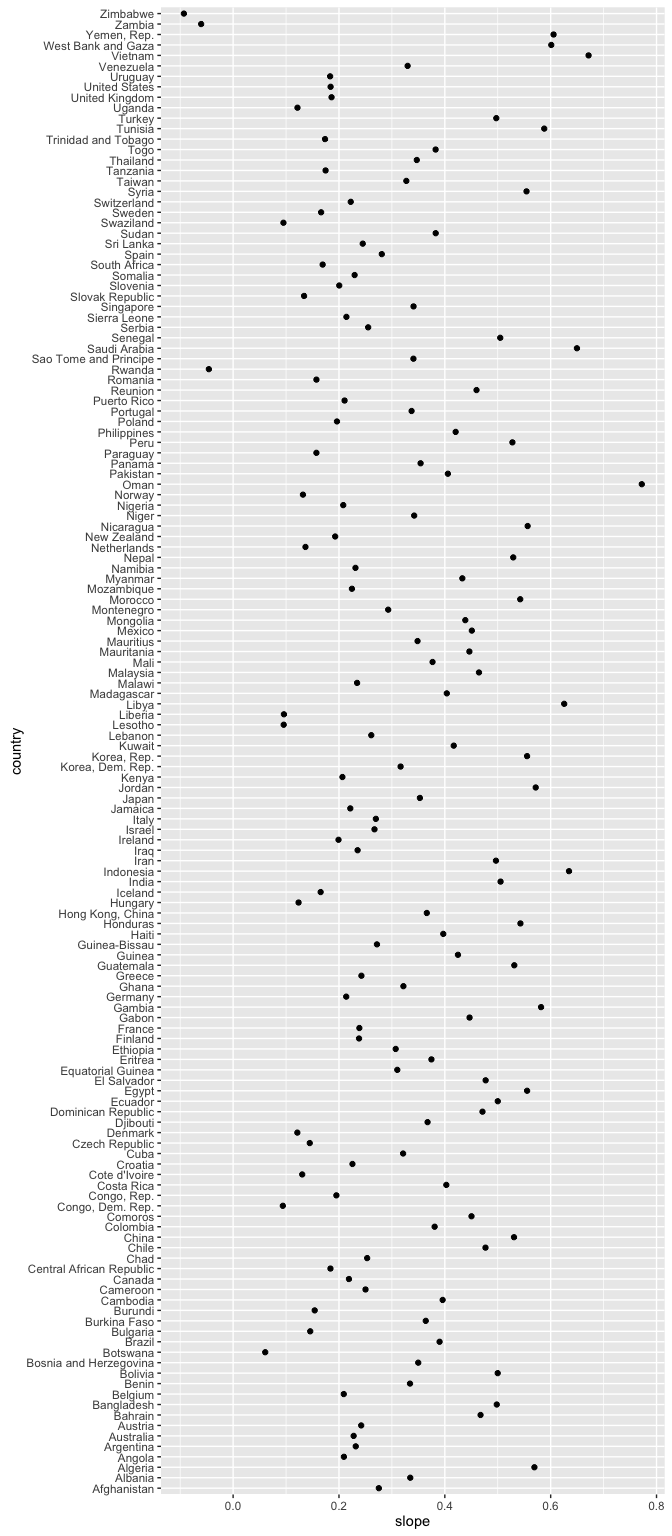
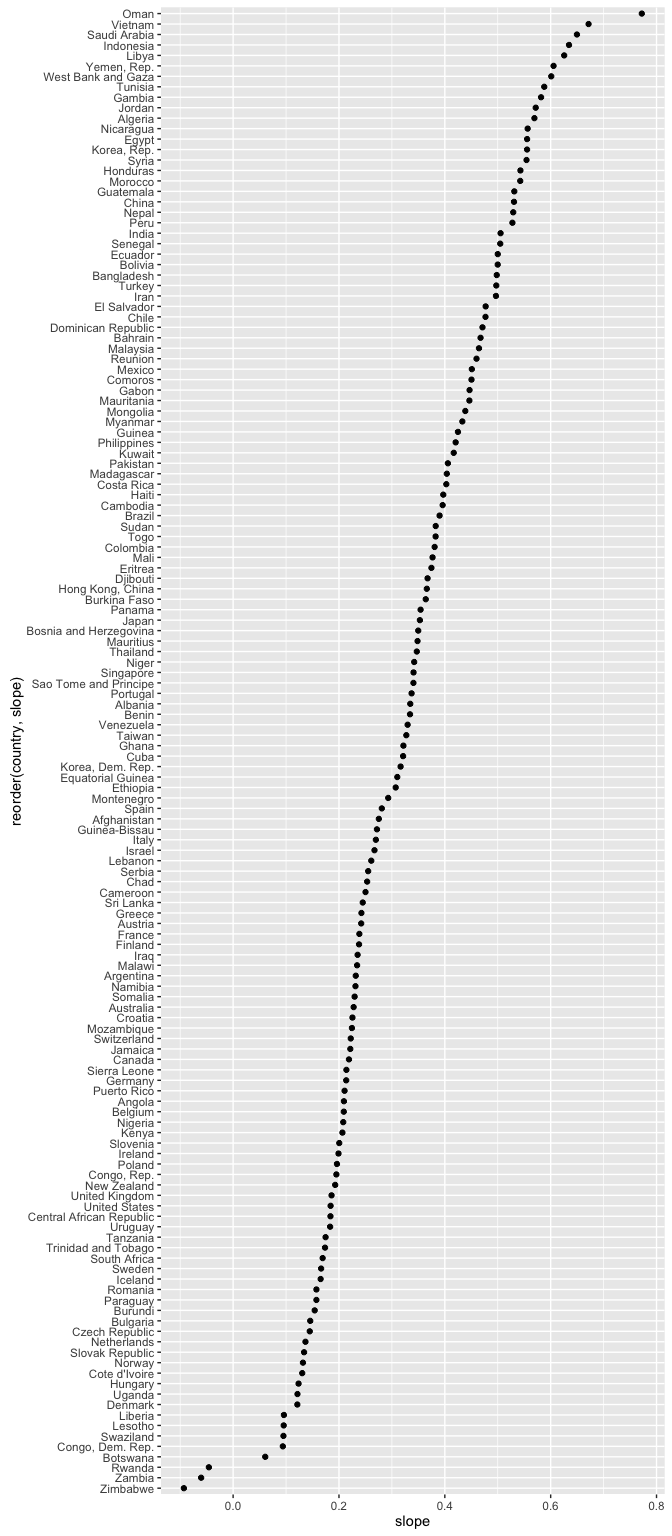
Which figure do you find easier to navigate? Which is more interesting? The unsorted, i.e. alphabetical, is an example of visual data puke, because there is no effort to help the viewer learn anything from the plot, even though it is really easy to do so. At the very least, always consider sorting your factor levels in some principled way.
The same point generally applies to tables as well.
Exercise (part of HW05): Consider post_arrange, post_reorder, and post_both as defined below. State how the objects differ and discuss the differences in terms of utility within an exploratory analysis. If I swapped out arrange(country) for arrange(slope), would we get the same result? Do you have any preference for one arrange statement over the other?
post_arrange <- gcoefs %>% arrange(slope)
post_reorder <- gcoefs %>%
mutate(country = reorder(country, slope))
post_both <- gcoefs %>%
mutate(country = reorder(country, slope)) %>%
arrange(country)droplevels() to drop unused factor levels
Many demos will be clearer if we create a smaller dataset with just a few countries.
Let’s look at these five countries: Egypt, Haiti, Romania, Thailand, Venezuela.
h_countries <- c("Egypt", "Haiti", "Romania", "Thailand", "Venezuela")
hDat <- gapminder %>%
filter(country %in% h_countries)
hDat %>% str()
## Classes 'tbl_df', 'tbl' and 'data.frame': 60 obs. of 6 variables:
## $ country : Factor w/ 142 levels "Afghanistan",..: 39 39 39 39 39 39 39 39 39 39 ...
## $ continent: Factor w/ 5 levels "Africa","Americas",..: 1 1 1 1 1 1 1 1 1 1 ...
## $ year : int 1952 1957 1962 1967 1972 1977 1982 1987 1992 1997 ...
## $ lifeExp : num 41.9 44.4 47 49.3 51.1 ...
## $ pop : int 22223309 25009741 28173309 31681188 34807417 38783863 45681811 52799062 59402198 66134291 ...
## $ gdpPercap: num 1419 1459 1693 1815 2024 ...Look at the country factor. Look at it hard.
#table(hDat$country)
#levels(hDat$country)
nlevels(hDat$country)
## [1] 142Even though hDat contains data for only 5 countries, the other 137 countries remain as possible levels of the country factor. Sometimes this is exactly what you want but sometimes it’s not.
When you want to drop unused factor levels, use droplevels().
iDat <- hDat %>% droplevels()
iDat %>% str()
## Classes 'tbl_df', 'tbl' and 'data.frame': 60 obs. of 6 variables:
## $ country : Factor w/ 5 levels "Egypt","Haiti",..: 1 1 1 1 1 1 1 1 1 1 ...
## $ continent: Factor w/ 4 levels "Africa","Americas",..: 1 1 1 1 1 1 1 1 1 1 ...
## $ year : int 1952 1957 1962 1967 1972 1977 1982 1987 1992 1997 ...
## $ lifeExp : num 41.9 44.4 47 49.3 51.1 ...
## $ pop : int 22223309 25009741 28173309 31681188 34807417 38783863 45681811 52799062 59402198 66134291 ...
## $ gdpPercap: num 1419 1459 1693 1815 2024 ...
table(iDat$country)
##
## Egypt Haiti Romania Thailand Venezuela
## 12 12 12 12 12
levels(iDat$country)
## [1] "Egypt" "Haiti" "Romania" "Thailand" "Venezuela"
nlevels(iDat$country)
## [1] 5reorder() to reorder factor levels
Now that we have a more manageable set of 5 countries, let’s compute their max life expectancies, view them, and view life expectancy vs. year.
i_le_max <- iDat %>%
group_by(country) %>%
summarize(max_le = max(lifeExp))
i_le_max
## # A tibble: 5 × 2
## country max_le
## <fctr> <dbl>
## 1 Egypt 71.338
## 2 Haiti 60.916
## 3 Romania 72.476
## 4 Thailand 70.616
## 5 Venezuela 73.747ggplot(i_le_max, aes(x = country, y = max_le, group = 1)) +
geom_path() + geom_point()
ggplot(iDat, aes(x = year, y = lifeExp, group = country)) +
geom_line(aes(color = country))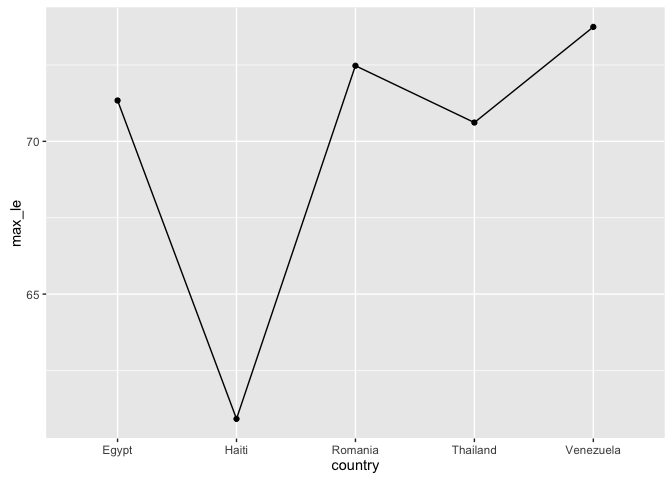
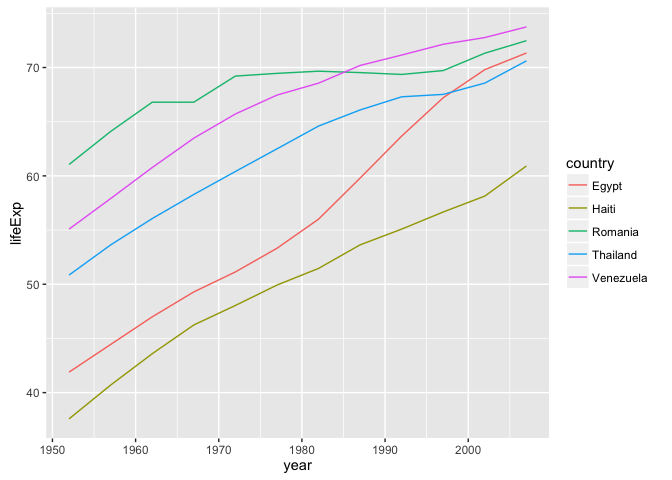
Here’s a plot of the max life expectancies and a spaghetti plot of life expectancy over time. Notice how the first plot jumps around? Notice how the legend of the second plot is completely out of order with the data?
Use the function reorder() to change the order of factor levels. Read its documentation.
reorder(your_factor, your_quant_var, your_summarization_function)Let’s reorder the country factor logically, in this case by maximum life expectancy. Even though i_le_max already holds these numbers, I’m going to enact the reordering with the “raw” data to illustrate more about the reorder() function.
jDat <- iDat %>%
mutate(country = reorder(country, lifeExp, max))
data.frame(before = levels(iDat$country), after = levels(jDat$country))
## before after
## 1 Egypt Haiti
## 2 Haiti Thailand
## 3 Romania Egypt
## 4 Thailand Romania
## 5 Venezuela Venezuela
j_le_max <- i_le_max %>%
mutate(country = reorder(country, max_le))
j_le_max <- i_le_max %>%
mutate(country = factor(country, levels = levels(jDat$country)))Let’s revisit the two figures to see how much more natural they are.
ggplot(j_le_max, aes(x = country, y = max_le, group = 1)) +
geom_line() + geom_point()
ggplot(jDat, aes(x = year, y = lifeExp)) +
geom_line(aes(color = country)) +
guides(color = guide_legend(reverse = TRUE))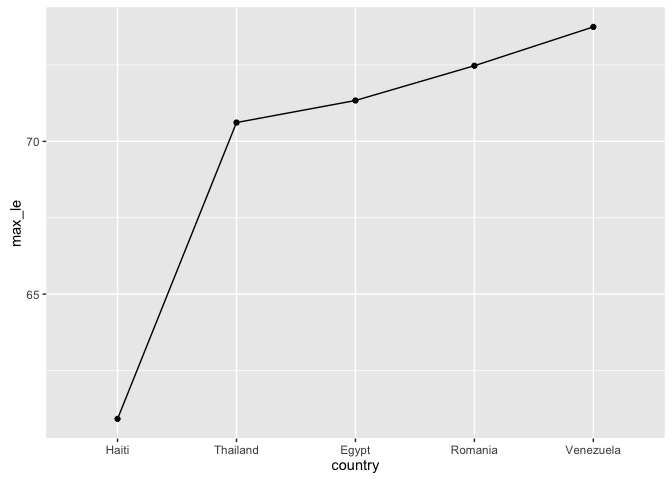
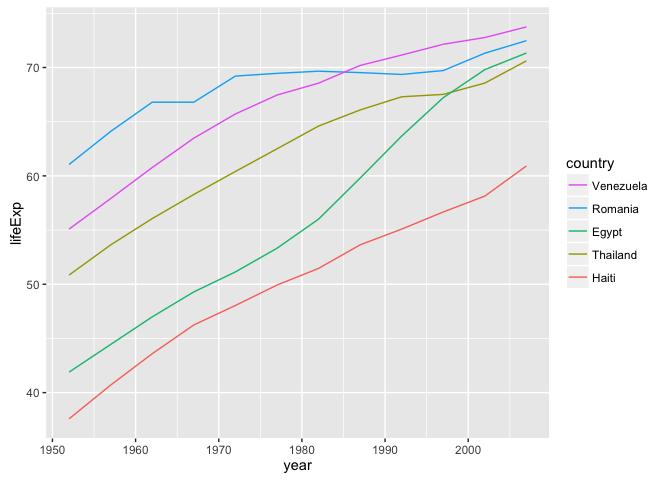
Conclusion: Use reorder() to reorder a factor according to a quantitative variable. A simple call like this:
reorder(your_factor, your_quant_var)implies that the summarization function will default to mean(). If that’s not what you want, specify your own summarization function. It could be built-in, such as max(), or could be written by you on-the-fly or in advance.
You can do this and alter your actual data (or a new copy thereof). Or you can do this reordering on-the-fly, i.e. in an actual plotting or tabulation call, leaving the underlying data untouched.
reorder() exercise
Reorder the continent factor, according to the estimated intercepts.
To review, remember we have computed the estimated intercept and slope for each country:
head(gcoefs)
## # A tibble: 6 × 4
## country continent intercept slope
## <fctr> <fctr> <dbl> <dbl>
## 1 Afghanistan Asia 29.90729 0.2753287
## 2 Albania Europe 59.22913 0.3346832
## 3 Algeria Africa 43.37497 0.5692797
## 4 Angola Africa 32.12665 0.2093399
## 5 Argentina Americas 62.68844 0.2317084
## 6 Australia Oceania 68.40051 0.2277238The figure on the left gives a stripplot of estimate intercepts, by continent, with continent in alphabetical order. The line connects continent-specific averages of the intercepts (approx. equal to life expectancy in 1952). The figure on the right gives same plot after the continents have been reordered by average estimated intercept.
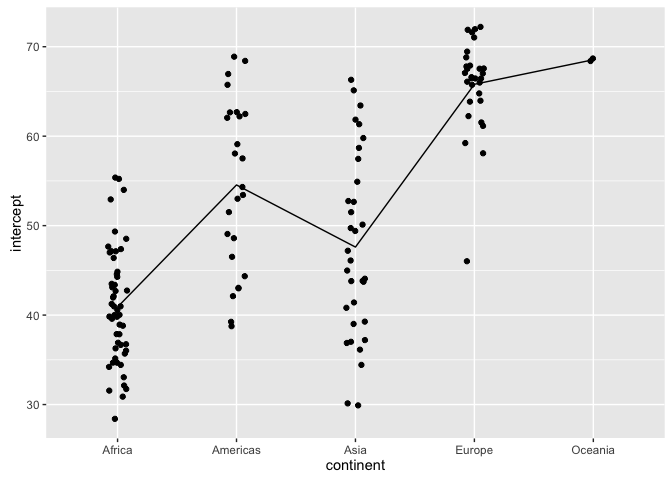
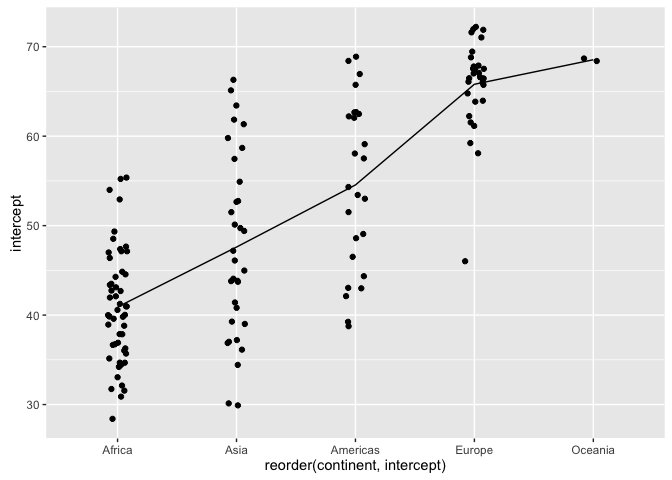
Exercise: Write the reorder() statement to do this.
Revaluing factor levels
What if you want to recode factor levels? I usually use the revalue() function from plyr; sometime I use plyr::mapvalues() which is a bit more general. In the past I have also used the recode() function from the car package.
k_countries <- c("Australia", "Korea, Dem. Rep.", "Korea, Rep.")
kDat <- gapminder %>%
filter(country %in% k_countries, year > 2000) %>%
droplevels()
kDat
## # A tibble: 6 × 6
## country continent year lifeExp pop gdpPercap
## <fctr> <fctr> <int> <dbl> <int> <dbl>
## 1 Australia Oceania 2002 80.370 19546792 30687.755
## 2 Australia Oceania 2007 81.235 20434176 34435.367
## 3 Korea, Dem. Rep. Asia 2002 66.662 22215365 1646.758
## 4 Korea, Dem. Rep. Asia 2007 67.297 23301725 1593.065
## 5 Korea, Rep. Asia 2002 77.045 47969150 19233.988
## 6 Korea, Rep. Asia 2007 78.623 49044790 23348.140
levels(kDat$country)
## [1] "Australia" "Korea, Dem. Rep." "Korea, Rep."
kDat <- kDat %>%
mutate(new_country = revalue(country,
c("Australia" = "Oz",
"Korea, Dem. Rep." = "North Korea",
"Korea, Rep." = "South Korea")))
data_frame(levels(kDat$country), levels(kDat$new_country))
## # A tibble: 3 × 2
## `levels(kDat$country)` `levels(kDat$new_country)`
## <chr> <chr>
## 1 Australia Oz
## 2 Korea, Dem. Rep. North Korea
## 3 Korea, Rep. South Korea
kDat
## # A tibble: 6 × 7
## country continent year lifeExp pop gdpPercap new_country
## <fctr> <fctr> <int> <dbl> <int> <dbl> <fctr>
## 1 Australia Oceania 2002 80.370 19546792 30687.755 Oz
## 2 Australia Oceania 2007 81.235 20434176 34435.367 Oz
## 3 Korea, Dem. Rep. Asia 2002 66.662 22215365 1646.758 North Korea
## 4 Korea, Dem. Rep. Asia 2007 67.297 23301725 1593.065 North Korea
## 5 Korea, Rep. Asia 2002 77.045 47969150 19233.988 South Korea
## 6 Korea, Rep. Asia 2007 78.623 49044790 23348.140 South KoreaGrow a factor object
Try to avoid this. If you must rbind()ing data.frames works much better than c()ing vectors.
usa <- gapminder %>%
filter(country == "United States", year > 2000) %>%
droplevels()
mex <- gapminder %>%
filter(country == "Mexico", year > 2000) %>%
droplevels()
str(usa)
## Classes 'tbl_df', 'tbl' and 'data.frame': 2 obs. of 6 variables:
## $ country : Factor w/ 1 level "United States": 1 1
## $ continent: Factor w/ 1 level "Americas": 1 1
## $ year : int 2002 2007
## $ lifeExp : num 77.3 78.2
## $ pop : int 287675526 301139947
## $ gdpPercap: num 39097 42952
str(mex)
## Classes 'tbl_df', 'tbl' and 'data.frame': 2 obs. of 6 variables:
## $ country : Factor w/ 1 level "Mexico": 1 1
## $ continent: Factor w/ 1 level "Americas": 1 1
## $ year : int 2002 2007
## $ lifeExp : num 74.9 76.2
## $ pop : int 102479927 108700891
## $ gdpPercap: num 10742 11978
usa_mex <- rbind(usa, mex)
## rbinding data.frames works!
str(usa_mex)
## Classes 'tbl_df', 'tbl' and 'data.frame': 4 obs. of 6 variables:
## $ country : Factor w/ 2 levels "United States",..: 1 1 2 2
## $ continent: Factor w/ 1 level "Americas": 1 1 1 1
## $ year : int 2002 2007 2002 2007
## $ lifeExp : num 77.3 78.2 74.9 76.2
## $ pop : int 287675526 301139947 102479927 108700891
## $ gdpPercap: num 39097 42952 10742 11978
## simply catenating factors does not work!
(oops <- c(usa$country, mex$country))
## [1] 1 1 1 1
## workaround
(yeah <- factor(c(levels(usa$country)[usa$country],
levels(mex$country)[mex$country])))
## [1] United States United States Mexico Mexico
## Levels: Mexico United StatesIf you really want to catenate factors with different levels, you must first convert to their levels as character data, combine, then re-convert to factor.
Make a factor from scratch
The factor() function will explicitly create a factor de novo. Let’s start with an example we are familiar with. Pretend the continent variable in gapminder was a not a factor, but character.
gapminder$continent <- as.character(gapminder$continent)
#prove it
str(gapminder)
## Classes 'tbl_df', 'tbl' and 'data.frame': 1704 obs. of 6 variables:
## $ country : Factor w/ 142 levels "Afghanistan",..: 1 1 1 1 1 1 1 1 1 1 ...
## $ continent: chr "Asia" "Asia" "Asia" "Asia" ...
## $ year : int 1952 1957 1962 1967 1972 1977 1982 1987 1992 1997 ...
## $ lifeExp : num 28.8 30.3 32 34 36.1 ...
## $ pop : int 8425333 9240934 10267083 11537966 13079460 14880372 12881816 13867957 16317921 22227415 ...
## $ gdpPercap: num 779 821 853 836 740 ...
head(gapminder)
## # A tibble: 6 × 6
## country continent year lifeExp pop gdpPercap
## <fctr> <chr> <int> <dbl> <int> <dbl>
## 1 Afghanistan Asia 1952 28.801 8425333 779.4453
## 2 Afghanistan Asia 1957 30.332 9240934 820.8530
## 3 Afghanistan Asia 1962 31.997 10267083 853.1007
## 4 Afghanistan Asia 1967 34.020 11537966 836.1971
## 5 Afghanistan Asia 1972 36.088 13079460 739.9811
## 6 Afghanistan Asia 1977 38.438 14880372 786.1134We can now turn it back into a factor by calling factor. The first argument is the input (usually character), followed by factor levels, which will default to the unique input values, in alphabetical order.
gapminder$continent <- factor(gapminder$continent)
#prove it
str(gapminder)
## Classes 'tbl_df', 'tbl' and 'data.frame': 1704 obs. of 6 variables:
## $ country : Factor w/ 142 levels "Afghanistan",..: 1 1 1 1 1 1 1 1 1 1 ...
## $ continent: Factor w/ 5 levels "Africa","Americas",..: 3 3 3 3 3 3 3 3 3 3 ...
## $ year : int 1952 1957 1962 1967 1972 1977 1982 1987 1992 1997 ...
## $ lifeExp : num 28.8 30.3 32 34 36.1 ...
## $ pop : int 8425333 9240934 10267083 11537966 13079460 14880372 12881816 13867957 16317921 22227415 ...
## $ gdpPercap: num 779 821 853 836 740 ...
head(gapminder)
## # A tibble: 6 × 6
## country continent year lifeExp pop gdpPercap
## <fctr> <fctr> <int> <dbl> <int> <dbl>
## 1 Afghanistan Asia 1952 28.801 8425333 779.4453
## 2 Afghanistan Asia 1957 30.332 9240934 820.8530
## 3 Afghanistan Asia 1962 31.997 10267083 853.1007
## 4 Afghanistan Asia 1967 34.020 11537966 836.1971
## 5 Afghanistan Asia 1972 36.088 13079460 739.9811
## 6 Afghanistan Asia 1977 38.438 14880372 786.1134